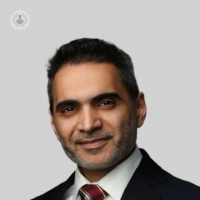Proactive prostate health: The importance of early screening and prevention by your GP
Autore:The prostate is a small gland located below the bladder, and its primary function is to produce fluid that nourishes and transports sperm. However, it can be prone to various issues, including benign enlargement, also known as benign prostatic hyperplasia, inflammation (prostatitis), and, most concerning, prostate cancer.
Early screening and prevention are crucial to managing these conditions effectively, and your GP plays a pivotal role in this process. Leading GP Dr Asif Naseem tells us all about it, in this informative article.

How important is early screening?
Early detection of prostate issues, especially prostate cancer, is vital for successful treatment and better outcomes. Prostate cancer is one of the most common cancers among men, but it often develops slowly and may not cause symptoms in the early stages. This makes regular screening essential, as it can identify the disease before it progresses to a more advanced and potentially life-threatening stage.
Screening typically involves two main tests:
- Prostate-specific antigen (PSA) test: This blood test measures the level of PSA, a protein produced by the prostate. Elevated levels can indicate prostate cancer, but they can also be a sign of other prostate conditions such as benign prostatic hyperplasia or prostatitis.
- Digital rectal examination (DRE): During a DRE, your GP will physically examine the prostate through the rectum to check for abnormalities in size, shape, and texture.
Men over the age of 50 are generally advised to discuss prostate screening with their GP, especially if they have a family history of prostate cancer or are at higher risk due to factors such as age and ethnicity. For some, starting screening at an earlier age may be recommended.
What are the prevention strategies for prostate health?
While some risk factors for prostate issues, such as age and genetics, cannot be changed, there are proactive steps that men can take to maintain prostate health:
- Healthy diet: A diet rich in fruits, vegetables, and whole grains, and low in red and processed meats, can help reduce the risk of prostate problems. Foods high in antioxidants, such as tomatoes (which contain lycopene), and green tea, are thought to be particularly beneficial.
- Regular exercise: Physical activity helps maintain a healthy weight and can reduce the risk of prostate cancer. Exercise also supports overall health and well-being, which is crucial for disease prevention.
- Avoiding smoking and limiting alcohol: Both smoking and excessive alcohol consumption are linked to a higher risk of various cancers, including prostate cancer. Quitting smoking and moderating alcohol intake can significantly improve your long-term health.
- Regular check-ups: Even if you don’t have symptoms, regular visits to your GP can help monitor your prostate health. Early intervention is key to preventing minor issues from becoming more serious.
What is the GP's role in prostate health?
Your GP is your first point of contact for concerns about prostate health. They can provide advice on screening options, lifestyle changes, and any symptoms you might be experiencing. If there are signs of prostate issues, your GP may refer you to a specialist, such as a urologist, for further evaluation and treatment.
It's important to maintain open communication with your GP about your health and any changes you notice. Early detection and proactive management can significantly improve your quality of life and outcomes if prostate issues arise. Regular screenings and a proactive approach to health can help ensure that any potential problems are caught early and treated effectively.
Want to take charge of your prostate health? Arrange a consultation with Dr Naseem via his Top Doctors profile.


